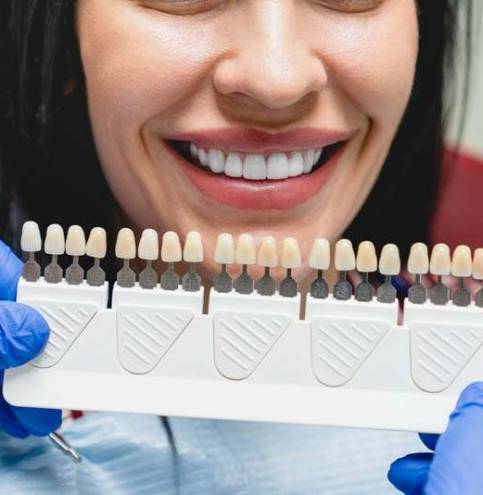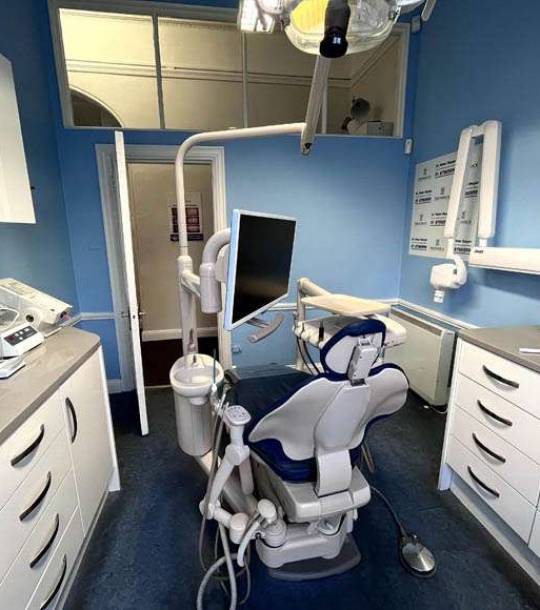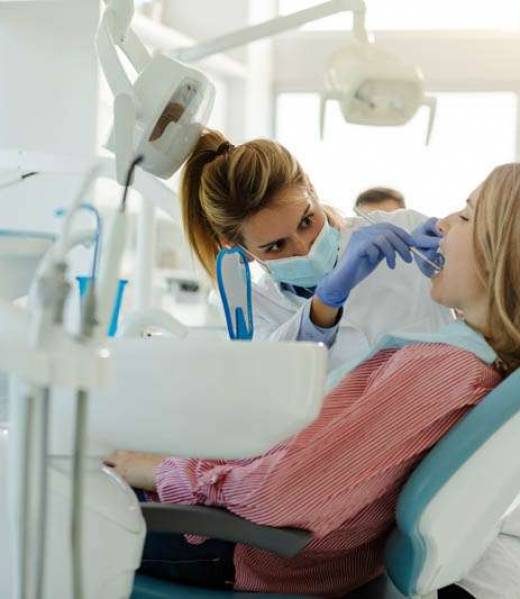Dental Crowns
Are you struggling to feel confident when you smile? Do you need a dentist near you to help with your smile makeover? Then, it’s time to discover how to transform your smile with our cosmetic dental treatments
At Frederick Dental Clinic, our specialized dentists in Dublin 1 understand that all patients want to look and feel their best. Dental crowns restore shape, strengthen function and improve the general appearance of teeth avoiding a tooth extraction and restoring aesthetic appearance.

What exactly are Dental Crowns?
Dental crowns are caps placed on teeth to encase the damaged tooth’s outer surface, securely cementing the tooth’s surface long-term. Since dental crowns cover the entire visible layer, a dental crown effectively becomes the tooth’s new outer surface. Crowns are commonly applied to cover and protect the outer surface of the teeth when fillings don’t solve the initial issue. Dental crowns are typically durable materials such as porcelain, metals or ceramics. Crowns are also used to give a tooth stability after a root canal.
Patients need to be aware that dental crowns are composed of very durable materials but are still subject to decay when it connects to the tooth and daily wear and tear. Maintaining a good oral health routine will keep your dental crown healthy for as long as possible.
What are Crowns used to treat?
Similar to most forms of restorative dentistry, dental crowns are used to improve the overall appearance of a tooth’s structure and health. Other reasons for receiving dental crowns can include:
- Restoration of a fractured tooth.
- Attachment of a bridge.
- Replace a large filling.
- Protect weak teeth from fracturing.
- Coverage of a tooth that received a root canal treatment.
Crowns can also be used to change the shape, size, and length of your teeth.


Do I need a Dental Crown?
A dental crown is a covering that encases the entire tooth surface restoring it to its original shape and size. A crown protects and strengthens tooth structure that cannot be restored with fillings or other types of restorations.
There are several reasons why your dentist may recommend a dental crown. Below are the most common indications for dental crowns:
When a tooth cracks or breaks, it is important to restore it as soon as possible. Dental crowns will not only improve the appearance of the broken tooth, but it will also prevent the tooth from further breakage.
Cavities can cause a lot of damage to the tooth. In some cases, the decay is so severe that there is not enough remaining structure to support a filling. In situations like this, your dentist will recommend a dental crown.
Teeth that are misshapen or severely discolored can be improved with dental crowns.
After having a root canal treatment, your dentist will place a dental crown over the treated tooth to protect and strengthen it.
A dental implant requires a dental crown to complete the procedure.
Treatment Process
The procedure in placing a dental crown usually takes two visits to the dentist. During the first visit, the tooth will be prepared for the dental crown. This involves removing some of the enamel from the tooth so that the dental crown can fit over it. An impression will be made of your tooth so that a mold can be made. A temporary dental crown will be placed over your tooth until your permanent one is ready.
The second visit will involve removing the temporary dental crown and replacing it with your permanent one. The dental crown will be checked for fit and then cemented into place.
The process for receiving dental crowns will depend on whether your dentist decides to do a one-day or multiple-day procedure. The first thing our specialised dentist will do is identify and open any cavities and will then trim the tooth. This process will create a base for the crown application. Next, the dentist will safely numb the tooth’s surrounding area with a local anaesthetic. The tooth will then be filed down, and an impression of it taken. This impression allows for the exact construction of your tooth. The crown is then cemented with minimal discomfort and zero pain.
Treatment time for dental crowns will vary from patient to patient, but typically a single crown can be applied in one visit. However, a traditional crown may require you to visit your dentist twice. The first visit will be an examination where the dentist will take images, x-rays and impressions to prepare the tooth for the crown. The dentist will then place a temporary crown over the tooth while the permanent crown is being developed in a lab. Once the permanent crown is created, the dentist will apply it to the prepared tooth, removing the temporary crown.
A ‘same-day’ procedure is where wearing a temporary crown is avoided and will involve the dentist taking digital pictures of your mouth. Using these images, the dentist can create the crown in the office during this same visit. Once the crown is prepared, your dentist will cement it into place. The entire process can take as little as one to two hours.
It is always best practice to ask our specialized dental team for a consultation before treatment to discover all options available for you. In addition, being aware of the procedure timeline and the cost for each treatment option will make this process even easier for each patient.
Dental crowns can be made out of different materials such as gold, ceramic, or porcelain. They can also be made out of a combination of these materials. Gold crowns are not as popular because they are not as natural looking as other materials. Ceramic and porcelain are more popular because they look more like natural teeth.

Patients
I needed a root canal and was in alot of pain before hand with head aches etc. The service was very professional, quick and pain free. I couldnt of been happier when the tooth was saved and it feels much better. Five star service!
March 29, 2022



Benefits of Dental Crowns
Dental crowns are a popular choice for restoring damaged teeth.
Improve the Appearance of Your Smile
Protect Damaged Teeth
Support Teeth with Large Fillings
Strengthen Weak Teeth
Book a Consultation Today
Real Life Case Studies
We help you get that smile you always dreamed of
- All
- Cosmetic Dental Treatments
Alternative Treatment Options
Book a consultation today with one of our team, who will be happy to discuss these options with you in-depth, and assess your suitability for a dental crown.
Our Prices

How much do Dental Crowns Cost?
We help you get that smile you always dreamed of
- Teeth Whitening €330
Teeth Whitening (Home Kit)
- Dental Crown €1100-€1400
Price per unit, depending on material used (prices may vary)
- Dental Bridge €1100-€1400
Price per unit, depending on material used (prices may vary)
- Crown Recementation €100-€250
For crown recementation
- Veneers €800–€1000
- Dentures €750–€1400
Got a Question about Dental Crowns?












